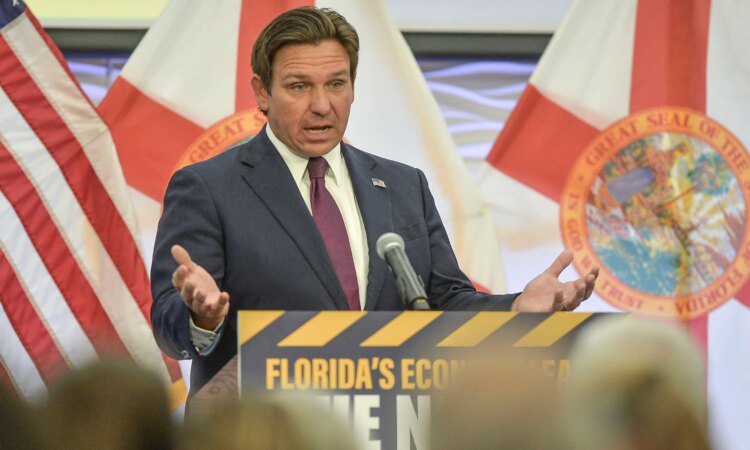
- Florida Gov. Ron DeSantis is pushing to eliminate local property taxes on primary residences in the state.
- Critics warn this could lead to fewer local services and give the state more control over city and county budgets.
- In particular, the plan could make smaller, rural counties dependent on the state legislature for funding.
Gov. Ron DeSantis’ push to eliminate local property taxes is looming as a kind of political capstone as the Republican leader moves into his final year as Florida’s chief executive.
He’s called the tax-cutting idea the “Big Kahuna.”
And DeSantis’ plan to ask voters to erase property taxes, at least on homesteaded primary residences, would certainly change the state.
Maybe not for the better, though, critics say.

Higher home prices, fewer city and county services, and state government gaining enhanced authority over the purse strings and policies of Florida’s hometowns is a likely product, according to those analyzing the approach.
“The governor and the Legislature are only showing you one side of the ledger: Cut taxes and you’ll pay less,” said George Kruse, a Manatee County commissioner and Republican. “Sure, that sounds good. It’s free ice cream. But what are you giving up?”
Not the least of the items lost – or at least changed – is the ability of local governments to give residents what they want, Kruse said.
Could small, rural counties become ‘wards of the state?’
One of DeSantis’ more dramatic ideas would be to cover all the revenue lost in the state’s 32 fiscally constrained counties with state taxpayer money. These small and rural counties rely heavily on property tax money to provide services, which would be endangered by tax-cutting the governor envisions.
Instead, DeSantis envisions these 32 counties – almost one-third of Florida’s 67 counties – coming to Tallahassee each year to lobby and receive state revenue from the Legislature.
DeSantis downplays the total amount needed – likely less than $250 million – as mere “budget dust.” But Kruse said such a relationship would turn these counties into “wards of the state.”
The governor and the Republican-controlled Legislature in recent years have enacted scores of so-called preemption measures that limit local governments’ ability to tax and spend; promote diversity, equity and inclusion; or even ban single-use plastics.
They’ve prevented cities and counties from enacting restrictions on rent hikes and safety protections for those working outdoors in Florida’s summer heat.
A new effort has effectively blocked new planning regulations – helping the development industry flourish but also representing the “largest incursion into local home rule authority” in Florida’s modern history, according to one of two lawsuits filed against the law.
Still, the property tax overhaul looks like the biggest swipe of all at the power of cities and counties.
While DeSantis has offered few specifics on his tax-cutting plan, his talk of wiping out property taxes on residences with a homestead exemption could eliminate 35% of the $55 billion local governments took in last year through the levy.
Tax collections have been climbing, fueling call for change
To be sure, tax collections have been going up. According to Florida TaxWatch, the total is double what was collected in 2014. And it’s 46% higher than the amount taken in statewide just four years ago.
That’s powered the governor’s arguments that local governments are getting fat while Floridians struggle to make ends meet.
“If you’re a Florida resident and you have a primary residence here … you ought to be able to own that free and clear of the government,” DeSantis has said.
DeSantis already has ridiculed eight property-tax cutting ideas that the Florida House laid out for consideration when the 2026 Legislature begins in January. He’s called the lineup of choices just political theater, even though they include a range of reductions, eliminations and bigger tax exemptions.
The term-limited governor, who leaves office in January 2027, is insistent: “I don’t think these legislators will be able to leave town without giving you an ability to vote yourself some meaningful relief,” he said.
Property taxes are the fuel for local government services, by far the biggest being public safety spending. But a portion of these revenues also finance parks, libraries, cultural and social programs, environmental efforts and a host of policy initiatives that sometimes run afoul of Florida’s Republican-dominated government.
For example, a property tax overhaul will create doomsday scenarios for the city of Tallahassee, the state capital, officials there say. Tallahassee Mayor John E. Dailey told lawmakers at a recent Leon County legislative delegation meeting that moves to reduce or eliminate property taxes “will wipe out parks and recreation.”
DOGE campaign may give glimpse of what’s to come
Florida Chief Financial Officer Blaise Ingoglia has been coursing the state to condemn spending decisions in mostly Democratic-leaning communities.
The campaign – modeled after the federal Department of Government Efficiency, or DOGE, effort once led by billionaire Elon Musk under President Trump – claims to have found $1.1 billion in alleged wasteful spending across eight local governments in Florida.
Ingoglia is simply relying on a mathematical formula – comparing population growth with spending growth – to draw his conclusions.
But his attacks have focused primarily on city and county spending on diversity programs, LGBTQ “Pride” events, Planned Parenthood support and other items that appeal to a Republican voting base easily antagonized by cultural flashpoints.
Such programs would clearly face more obstacles to funding if local budgets are stretched and the state plays a larger role in steering replacement dollars to communities.
DeSantis also hints at a bigger state role in funding local governments. He’s spoken about where money could be found outside property taxes.
Republican DeSantis sounds ready to ‘redistribute wealth’
“We have an ability as a state with tourism and other things, with snowbirds and all this, to be able for our local governments to have the adequate amount of revenue,” he said.
But making cities and counties more reliant on state government comes with a catch, analysts warn.
“You could wind up with cities and counties either being in a situation where they comply with what’s going on in Tallahassee, or they risk losing money for critical services,” said Shelton Weeks, who directs the Lucas Institute for Real Estate Development & Finance at Florida Gulf Coast University.
“This could make things more politicized,” he said. “For me, personally, I think things are political enough.”
Jared Walczak, vice president of state projects at the Tax Foundation, a non-partisan tax policy nonprofit, said Florida could be embarking on fundamental changes to the balance of government.
“Currently, if taxpayers want a higher level of service, they can vote for the people that will bring that about. Or if they want more efficiencies or lower taxes, they can do that,” Walczak said.
But if the state provides financing for small and rural counties, and larger locations find their spending limited, the political balance shifts, Walczak pointed out.
“When the state controls the purse, flexibility is gone,” he said. “And with the state controlling what localities can do, that can come with strings attached to it over time.”
John Kennedy is a reporter in the USA TODAY Network’s Florida Capital Bureau. He can be reached at jkennedy2@gannett.com, or on X at @JKennedyReport.




